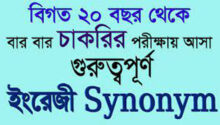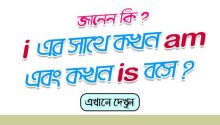Gerund & Participle চিনুন একদম সহজেঃ আর ভুল হবেনা কখনো

Gerund & Participle চেনার বিভ্রান্তির সমাধান
(৫ টি নিয়মের বিস্তারিত)
নিয়ম ০১
বাক্যের শুরুতে verb+ing + noun as object (subject হিসেবে) থাকলে যদি পরবর্তী verb টি singular হয় তাহলে প্রারম্ভিক verb+ing টি gerund হবে।
Peeling onions makes me cry.
(পেঁয়াজের খোসা ছাড়ানো আমাকে কাঁদায়)
Planting trees helps prevent soil erosion.
(গাছপালা রোপণ করা মাটিক্ষয় রোধ প্রতিরোধ করতে সাহায্য করে)
Amassing wealth often ruins health.
(সম্পদ পুঞ্জীভূত করা প্রায়ই সুস্থতা/স্বাস্থ্য ধ্বংস করে)
এখানে Peeling, Planting, Amassing হচ্ছে gerund কারণ, makes, helps, ruins এরা singular verb
আর finite verb টি plural হলে প্রারম্ভিক verb+ing টি
present participle হবে। এক্ষেত্রে উক্ত verb+ing টি কাজ করা বুঝায়।
Falling objects obey the law of gravity.
(পড়ন্ত বস্তু মাধ্যাকর্ষণের সূত্র মেনে চলে)
Hibernating animals survive the winter in suspended animation.
Exciting possibilities were/are opening up for me in the new job.
এখানে obey, survive, are/were হচ্ছে plural verb তাই falling, hibernating, exciting হচ্ছে present participle
কিন্তু এখানে পরে plural verb দেখে gerund + plural noun = plural compound কে যাতে গুলিয়ে না ফেলেন তাই সতর্কতা দরকার।
এক্ষেত্রে সামনের verb+ing হচ্ছে gerund
Washing machines are timesaving devices.
Washing machines have standard measurements to fit under kitchen units.
(বাক্য দুটোতে washing হচ্ছে gerund)
নিয়ম ০২
Article এবং noun এর মাঝে gerund এবং participle চেনার উপায়
Gerund হলে A (noun) for (verb+ing) হবে।
আর Participle হলে A (noun) is (verb+ing) হবে।
Gerund: A swimming pool
A pool for swimming
Participle: A swimming girl
A girl is swimming
Gerund: A sleeping room
A room for sleeping
A sleeping pill
A pill for sleeping
Participle: A sleeping child/baby
A baby/child is sleeping
সহজ কথায়, meaningful continuous tense করা গেলে present participle আর না করা গেলে gerund
কিন্তু এক্ষেত্রে প্রশ্নে part of speech (function) চাইলে gerund এবং participle দুটোই adjective হবে।
The calling bell is out of order. এখানে calling শব্দটি gerund হওয়া সত্ত্বেও adjective.
নিয়ম ০৩:
verb+ing টি transitive verb এর object হলে বা “কি” এর উত্তর দিলে তা gerund হবে।
He started/stopped writing/weeping.
প্রশ্ন: সে কি শুরু/বন্ধ করল? উত্তর : লেখা/কান্না করা।
তাই writing/weeping হচ্ছে gerund
কিন্তু transitive verb টি intransitively কাজ করলে তার পরের verb+ing টি present participle হবে।
He said weeping. (সে কাঁদতে কাঁদতে বলল)
কি বলল নয়, কিভাবে বলল? এমন প্রশ্ন হবে
আর এর উত্তর হবে কাঁদতে কাঁদতে?
তাই weeping হচ্ছে present participle
আবার, intransitive verb এর present participle বসে।
Come dancing. (নাচতে নাচতে আসো)
He came running to meet me.
come হচ্ছে intransitive verb তাই এর পরের dancing, running হচ্ছে present participle
অনুরূপ, I am going shopping this afternoon.
এখানে shopping হচ্ছে present participle
নিয়ম ০৪:
১. complement verb+ing এর আগে very বসানো গেলে তা participle, না গেলে তা gerund (জেরান্ড)
What annoys me most is smoking. (complement)
My favourite activity is reading. (complement)
smoking, reading এদের আগে very বসবে না। এরা সাধারণত কাজের নাম তাই gerund (জেরান্ড)
Education is enlightening.
Education is very enlightening.
The story is interesting.
It is very interesting.
Examinations are frightening.
Examinations are very frightening.
enlightening, interesting, frightening এরা present participle
আবার, এক্ষেত্রে What (কী) দ্বারা প্রশ্ন করে উত্তর হিসেবে প্রাপ্ত verb+ing হচ্ছে gerund আর How (কেমন) দ্বারা প্রশ্ন করে উত্তর হিসেবে verb+ing পাওয়া গেলে তা present participle
His profession is teaching.
Q: What is his profession? Ans: teaching
Education is enlightening.
Q: How is education? (শিক্ষা কেমন?)
Ans: enlightening (জ্ঞানগর্ভ, তথ্যদায়ক)
আবার, verb+ing টি verb এর থেকে ভিন্ন অর্থে বিশেষায়িত করলে তা present participle (adjective)
A walking holiday, a walking dictionary, a rolling programme, a rolling extension
২. Gerund complement হলে সেটাকে উল্টিয়ে Subject করা যায় কিন্তু participle হচ্ছে adjective তাই একে subject করা যায় না।
What I enjoy is watching movies.
= Watching movies is what I enjoy.
What I detest most is smoking.
= Smoking is what I detest most.
নিয়ম ০৫:
preposition এর পরে কিছু বিভ্রান্তি!
He came in running.
(সে দৌড়াতে দৌড়াতে ভিতরে আসল)
He went/walked out smiling.
(সে মুচকি হাসতে হাসতে বাইরে/হেঁটে বাইরে গেল)
এখানে running, smiling শব্দ দুটি preposition এর পরে বসা সত্ত্বেও এরা gerund নয়, present participle কারণ এরা preposition এর object হিসেবে বসেনি। এরা “কিভাবে” প্রশ্নটির উত্তর দেয়। তাই adverb এর মতো কাজ করে। preposition এর object হলে “কি/কিসে” এমন প্রশ্নের উত্তর লাগে।
There is no credit in earning money illegally.
(অবৈধভাবে টাকা উপার্জনে কৃতিত্ব নেই)
এখানে earning হচ্ছে gerund কারণ, “কিভাবে” নয়, কিসে কৃতিত্ব নেই? In what? এর উত্তর লাগবে? সেটা earning
আবার, I love the noise of falling rain (পড়ন্ত বৃষ্টি)
এখানে falling শব্দটা of কে object নয়, rain এর modifier তাই এটি present participle
জনস্বার্থে : মাস্টার জাহাঙ্গীর আলম
চাকরির ফ্রি সাজেশন পেতে এই লিঙ্কটি ভিজিট করুন
ইংরেজির ১০০টি শর্ট ডায়ালগ যা প্রতিদিনই ব্যবহার করতে হয়।

১০০ ইংরেজি শর্ট ডায়ালগ যা প্রায়ই ব্যবহৃত হয় What’s up –... আরো পড়ুন
ইংরেজির সবথেকে বেশি ব্যাবহৃত বাক্যসমূহ

কিছু গুরুত্বপূর্ণ ইংরেজি শর্ট ডায়ালগ Oh shit! – ধ্যাত্তেরি! Yes, go... আরো পড়ুন
ইংরেজির গুরুত্বপূর্ণ Synonym যা পরীক্ষায় বার বার আসে

০১) Amicable ( বন্ধুত্বপূর্ণ )➫ Friendly . ০২) Indigent ( অভাবী... আরো পড়ুন
বিসিএস রিটেনে ইংরেজি ২০০ মার্কের উত্তর করার কৌশল।

উত্তর পেয়েই সাথে সাথে খাতায় লেখা শুরু করবেন না। এইভাবে যখন... আরো পড়ুন
ইংরেজি সাহিত্যের A to Z প্রশ্ন একসাথে : চাকরির প্রস্তুতি

★ Age/Years : Victorian : 1832-1901 Anglo Saxon : 450-1066 Elizabethan... আরো পড়ুন
